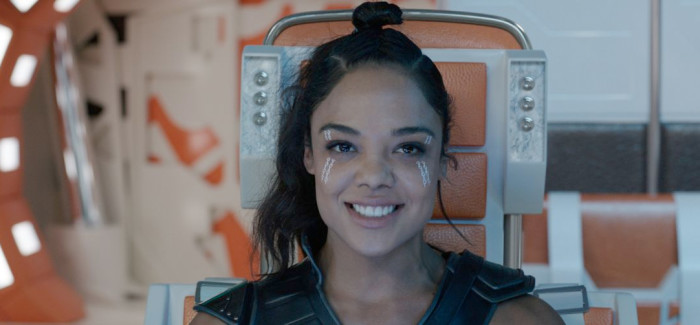Tessa Thompson Reveals That Her 'Thor: Ragnarok' Character Is Bisexual
Thor: Ragnarok marks a huge tonal shift for the Thor franchise into full-on comedy territory, but we've just learned that the movie also features a potentially significant benchmark for the Marvel Cinematic Universe as a whole: the first LGBTQI character in Marvel Studios history. But is that actually reflected on screen, or is this just another case of a studio attempting to pat themselves on the back for being diverse?Tessa Thompson, the actress who plays the Asgardian warrior Valkyrie in Ragnarok, spoke up on Twitter and confirmed that her character is bisexual:
She's bi. And yes, she cares very little about what men think of her. What a joy to play! https://t.co/d0LZKTHCfL
— Tessa Thompson (@TessaThompson_x) October 21, 2017
Hollywood doesn't exactly have a great track record when it comes to LGBTQI representation. Just look at some examples in the past year: Power Rangers blew the chance to do something interesting with one of its characters being openly gay, and Beauty and the Beast's gay character was wildly overhyped considering what we saw in that movie.
So the question is: does Valkyrie's bisexuality come across on screen? I saw the movie at a screening last week, and I admittedly didn't think much about her sexuality beyond the few times she and Thor make eyes at each other. Looking back on the film, Valkyrie being bi makes sense, but it's not something the movie concentrates on or devotes any significant time to. It's really cool that Thompson made that choice and incorporated it into her acting for this character, but I think it might have meant more if we actually saw more of those desires manifested in the movie itself.
The idea of a mainstream movie featuring a bi character and doesn't concentrate on her sexuality as a defining element of that character sounds great. That's the idealized future progressively-minded people are hoping for – one in which people of all genders and sexualities are on an equal playing field when it comes to representation on film, and everything is normalized to the point where dumb cliches and tropes have vanished and only the story remains. But it's going to take some work before we get there, and part of that work includes the simple act of showing bisexual characters' love lives on screen in a way that isn't exploitative or voyeuristic. Once it becomes so normal that no thinkpieces are written about these decisions, we'll know we're on the right track.
In the meantime, I'll leave you with thoughts from our own Jacob Hall, who was inspired by the representation in Star Trek Beyond to come out as bisexual himself:
It makes me feel genuinely good that certain studios, filmmakers, and actors are trying to be more inclusive with the stories they are telling. I believe that heads and hearts are in the right place whenever it's revealed that a certain character is gay or bi or anything else on the LGBTQ spectrum. While a certain contingent of the internet gets bent out of shape by the idea of representation (because they have no idea how painful it is to not be represented), this stuff matters. I've written about it before and I'll keep talking about it until we all perish in nuclear fire: Star Trek Beyond making Sulu gay literally changed my life and convinced me to come out as bisexual. And while that was only a brief scene, it was actually one of the better moments of representation in recent Hollywood blockbusters: Sulu was shown to have a child with another man. On screen. In a moment that is lingered upon and noticed by main characters. To feel normal, to feel like you're a part of a world you love so much, is something I have a hard time putting into words.
So I'm proud of Tessa Thompson for saying that Valkyrie is bisexual. That's great. That's awesome. I love that she made those choices. It's certainly better than a studio patting itself on the back for including LGBTQ characters whose lifestyles are a non-issue in the movie (a common and frustrating trend). It's definitely better than J.K. Rowling, one of the great storytellers of the past century, declaring that a major character is gay outside of the pages of her novels, where it doesn't matter nearly as much. I hope that Thompson's outspokenness connects with people and that we just roll with her character being bi into future movies because that would rock. But until it's on screen, until these choices matter to her character in a story itself where her identity carries weight and contributes to the narrative, it feels a little hollow. Thompson took a big first step. Now it's up to Marvel to follow through.

